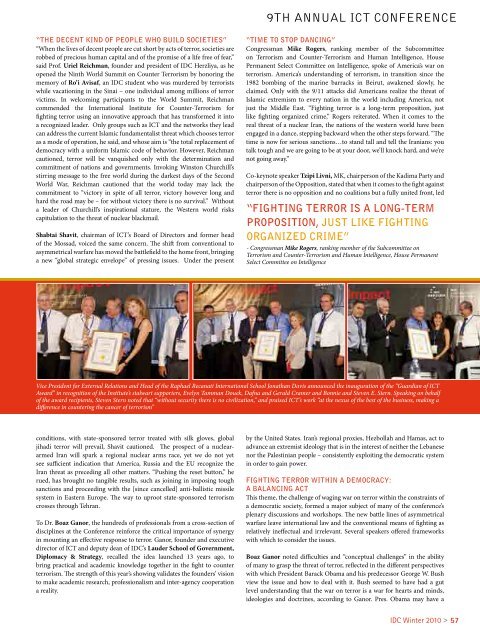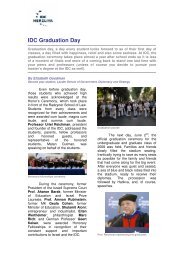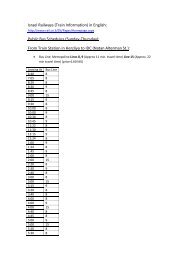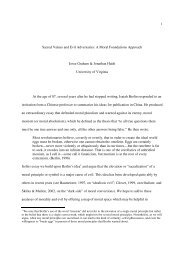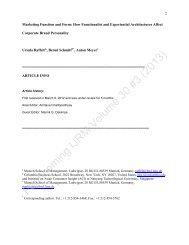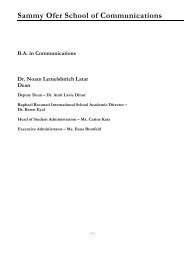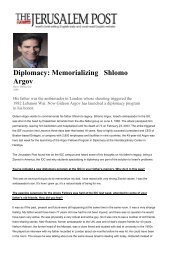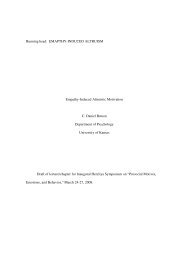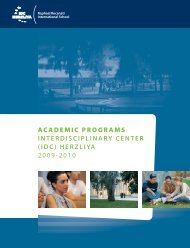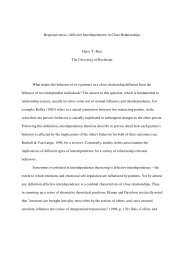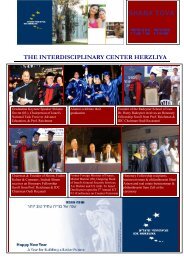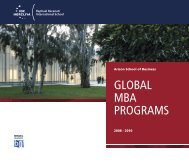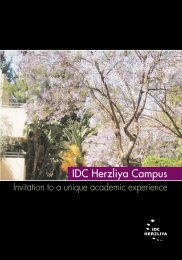The IDC
The IDC
The IDC
You also want an ePaper? Increase the reach of your titles
YUMPU automatically turns print PDFs into web optimized ePapers that Google loves.
“THE DECENT KIND OF PEOPLE WHO BUILD SOCIETIES”<br />
“When the lives of decent people are cut short by acts of terror, societies are<br />
robbed of precious human capital and of the promise of a life free of fear,”<br />
said Prof. Uriel Reichman, founder and president of <strong>IDC</strong> Herzliya, as he<br />
opened the Ninth World Summit on Counter Terrorism by honoring the<br />
memory of Ro’i Avisaf, an <strong>IDC</strong> student who was murdered by terrorists<br />
while vacationing in the Sinai – one individual among millions of terror<br />
victims. In welcoming participants to the World Summit, Reichman<br />
commended the International Institute for Counter-Terrorism for<br />
fighting terror using an innovative approach that has transformed it into<br />
a recognized leader. Only groups such as ICT and the networks they lead<br />
can address the current Islamic fundamentalist threat which chooses terror<br />
as a mode of operation, he said, and whose aim is “the total replacement of<br />
democracy with a uniform Islamic code of behavior. However, Reichman<br />
cautioned, terror will be vanquished only with the determination and<br />
commitment of nations and governments. Invoking Winston Churchill’s<br />
stirring message to the free world during the darkest days of the Second<br />
World War, Reichman cautioned that the world today may lack the<br />
commitment to “victory in spite of all terror, victory however long and<br />
hard the road may be – for without victory there is no survival.” Without<br />
a leader of Churchill’s inspirational stature, the Western world risks<br />
capitulation to the threat of nuclear blackmail.<br />
Shabtai Shavit, chairman of ICT’s Board of Directors and former head<br />
of the Mossad, voiced the same concern. <strong>The</strong> shift from conventional to<br />
asymmetrical warfare has moved the battlefield to the home front, bringing<br />
a new “global strategic envelope” of pressing issues. Under the present<br />
conditions, with state-sponsored terror treated with silk gloves, global<br />
jihadi terror will prevail, Shavit cautioned. <strong>The</strong> prospect of a nucleararmed<br />
Iran will spark a regional nuclear arms race, yet we do not yet<br />
see sufficient indication that America, Russia and the EU recognize the<br />
Iran threat as preceding all other matters. “Pushing the reset button,” he<br />
rued, has brought no tangible results, such as joining in imposing tough<br />
sanctions and proceeding with the [since cancelled] anti-ballistic missile<br />
system in Eastern Europe. <strong>The</strong> way to uproot state-sponsored terrorism<br />
crosses through Tehran.<br />
To Dr. Boaz Ganor, the hundreds of professionals from a cross-section of<br />
disciplines at the Conference reinforce the critical importance of synergy<br />
in mounting an effective response to terror. Ganor, founder and executive<br />
director of ICT and deputy dean of <strong>IDC</strong>’s Lauder School of Government,<br />
Diplomacy & Strategy, recalled the idea launched 13 years ago, to<br />
bring practical and academic knowledge together in the fight to counter<br />
terrorism. <strong>The</strong> strength of this year’s showing validates the founders’ vision<br />
to make academic research, professionalism and inter-agency cooperation<br />
a reality.<br />
9th AnnuAl ict cOnference<br />
“TIME TO STOP DANCING”<br />
Congressman Mike Rogers, ranking member of the Subcommittee<br />
on Terrorism and Counter-Terrorism and Human Intelligence, House<br />
Permanent Select Committee on Intelligence, spoke of America’s war on<br />
terrorism. America’s understanding of terrorism, in transition since the<br />
1982 bombing of the marine barracks in Beirut, awakened slowly, he<br />
claimed. Only with the 9/11 attacks did Americans realize the threat of<br />
Islamic extremism to every nation in the world including America, not<br />
just the Middle East. “Fighting terror is a long-term proposition, just<br />
like fighting organized crime,” Rogers reiterated. When it comes to the<br />
real threat of a nuclear Iran, the nations of the western world have been<br />
engaged in a dance, stepping backward when the other steps forward. “<strong>The</strong><br />
time is now for serious sanctions…to stand tall and tell the Iranians: you<br />
talk tough and we are going to be at your door, we’ll knock hard, and we’re<br />
not going away.”<br />
Co-keynote speaker Tzipi Livni, MK, chairperson of the Kadima Party and<br />
chairperson of the Opposition, stated that when it comes to the fight against<br />
terror there is no opposition and no coalitions but a fully united front, led<br />
“FIGHTING TERROR IS A LONG-TERM<br />
PROPOSITION, JUST LIKE FIGHTING<br />
ORGANIZED CRIME”<br />
- Congressman Mike Rogers, ranking member of the Subcommittee on<br />
Terrorism and Counter-Terrorism and Human Intelligence, House Permanent<br />
Select Committee on Intelligence<br />
Vice President for External Relations and Head of the Raphael Recanati International School Jonathan Davis announced the inauguration of the “Guardian of ICT<br />
Award” in recognition of the Institute’s stalwart supporters, Evelyn Tamman Douek, Dafna and Gerald Cramer and Bonnie and Steven E. Stern. Speaking on behalf<br />
of the award recipients, Steven Stern noted that “without security there is no civilization,” and praised ICT’s work “at the nexus of the best of the business, making a<br />
difference in countering the cancer of terrorism”<br />
by the United States. Iran’s regional proxies, Hezbollah and Hamas, act to<br />
advance an extremist ideology that is in the interest of neither the Lebanese<br />
nor the Palestinian people – consistently exploiting the democratic system<br />
in order to gain power.<br />
FIGHTING TERROR WITHIN A DEMOCRACY:<br />
A BALANCING ACT<br />
This theme, the challenge of waging war on terror within the constraints of<br />
a democratic society, formed a major subject of many of the conference’s<br />
plenary discussions and workshops. <strong>The</strong> new battle lines of asymmetrical<br />
warfare leave international law and the conventional means of fighting as<br />
relatively ineffectual and irrelevant. Several speakers offered frameworks<br />
with which to consider the issues.<br />
Boaz Ganor noted difficulties and “conceptual challenges” in the ability<br />
of many to grasp the threat of terror, reflected in the different perspectives<br />
with which President Barack Obama and his predecessor George W. Bush<br />
view the issue and how to deal with it. Bush seemed to have had a gut<br />
level understanding that the war on terror is a war for hearts and minds,<br />
ideologies and doctrines, according to Ganor. Pres. Obama may have a<br />
<strong>IDC</strong> Winter 2010 ><br />
57


